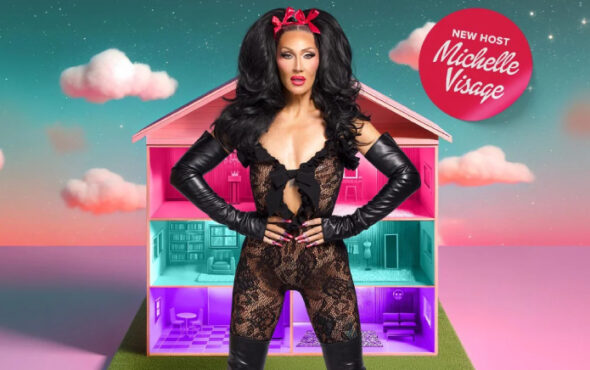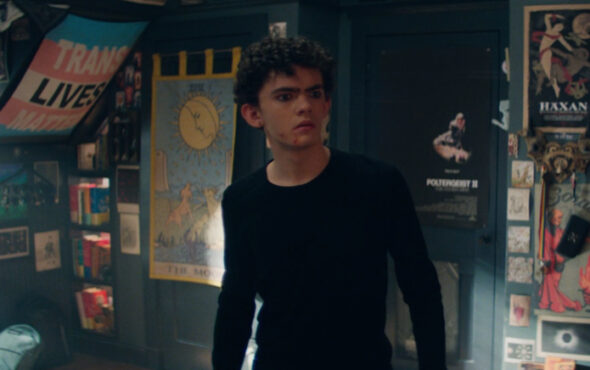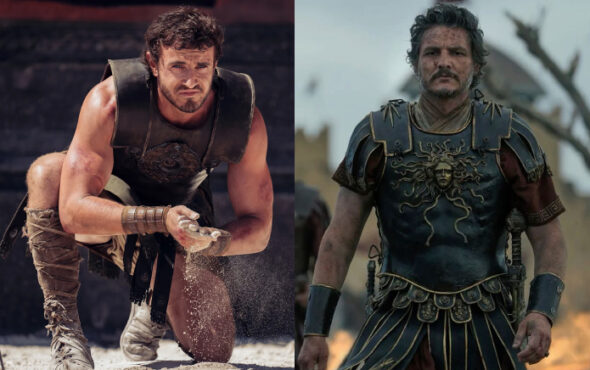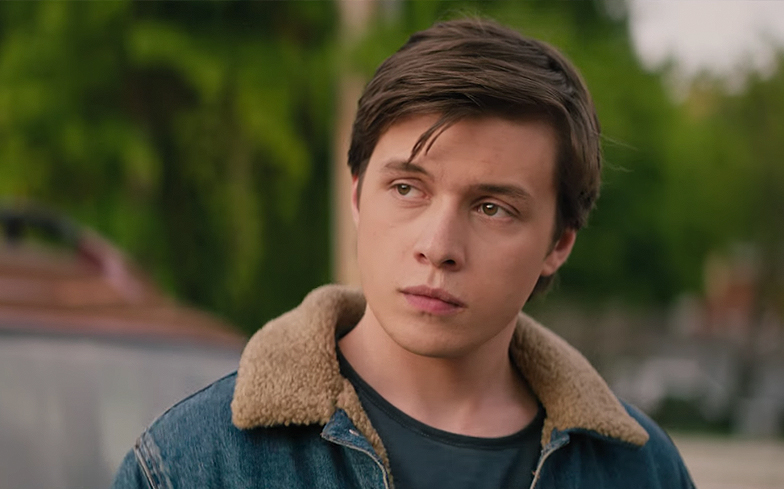
When you go to see 20th Century Fox’s latest romantic comedy Love, Simon, prepare to bawl your eyes out.
Not because the film is sad with a protagonist who has to endure tragic circumstances. Quite the opposite in fact.
The coming out movie – based on Becky Albertalli’s 2015 novel Simon Vs. The Homo Sapiens Agenda – follows 17-year-old Simon Spier as he comes to terms with his sexuality by emailing an anonymous admirer at his school.
While Simon goes through his own insecurities during his coming out journey – as well as being blackmailed by a fellow student who finds out his “huge ass secret” – the film has a refreshingly happy ending, complete with some seriously powerful moments that explores the experience every LGBTQ teenager has to go through.
The fact this is being presented to a mainstream audience on such a huge scale, it feels like a monumental release in LGBTQ cinema.
Gay Times caught up with Love, Simon director Greg Berlanti – whose work includes hit TV shows such as Riverdale, Arrow, and Supergirl amongst many others – to talk about the impact of the film, why it is much needed by today’s teens, and the changes he made to make the story work for the big screen.
Hi Greg! We’re sure you’ll get loads of people saying this to you, but it’s long overdue to see a movie like Love, Simon out in cinemas.
We have, and probably even more than I thought. It’s nice to hear, but it’s also sad to hear because you kind of wish that people didn’t have to say it.
I read a piece the other day which said although Love, Simon is groundbreaking for being the first mainstream romcom to have a gay lead, do today’s teenagers actually need it? So I want to put to you, why do today’s teens need this film?
I think, first of all back to your original point, the fact that it’s 2018 and there hasn’t been a gay teen protagonist in a mainstream studio film as the lead character in a romcom, teen movie, or anything, it’s way after we were doing this kind of stuff on television. So the absence of it is one thing. But also, the audience deserves stories that reflect our society and the world we live in. It makes the stories richer and deeper.
Obviously, I definitely made it with the kids in mind, the ones who don’t grow up in huge cities. I grew up just outside New York City, but also in a time when there was no awareness of who was gay. There was no sense of community. No online world. I felt really alone and disconnected. Even though the world is more connected and we’re aware of each other, I think gay kids, but also kids in general, it’s still very easy for them to feel very alone.
Where Simon’s story is really truly universal in terms of – especially in the age of social media – who they are presenting to the world, and who do they feel like on the inside. I would not want to be a teenager today! I think it’s a lot more of an obligation, and a lot more terrifying in certain ways. So hopefully this makes them laugh and have fun, and also makes them feel connected to other people.
Yeah, and on a more basic level it is the simple fact of representation.
Absolutely. I’ve had the experience of seeing Love, Simon with over 20 different groups of people, and I will tell you that I’ve never seen where – no spoilers, but there’s a happy moment at the end as there would be in any mainstream romantic comedy – people from all walks of life are applauding that kiss. Young people, old people, people from the American red states, and the blue states. It’s so validating to witness.
It’s for LGBTQ people in particular, but also straight people see that and go to the movies and experience that. Just watching the visceral reaction is really affirming. I encourage everyone to go and experience it.
https://www.instagram.com/p/BgWYj6wFtuM/
Related: We have no doubt just how important Love, Simon will be for queer youth – review
One of my favourite scenes in the movie is the big dancing Whitney Houston number where Simon imagines what he expected his coming out to be like. It’s not in the book, so where did the idea for that moment come from?
What I think was important to demonstrate at that point in the movie is the sense of, in his mind he’s sorting of waiting to live. He’s waiting to be exuberant. He’s telling himself, I’ll be my most happy version of myself with no holds barred. I’ll be as gay as I want to be.
Certainly for the back half of the movie, he realizes that no, he should start living honestly today. It won’t look like a musical number, but it will be just as satisfying in itself. That was the decision to dramatise it in that way.
Then we have Clark Moore star as Ethan in the movie, who also isn’t in the book. Why was it important for you to add in that character?
I wanted to add an openly gay kid because I think it’s much more common today to have more than just one gay kid at school. Also, I remember myself being a closeted gay kid in college as well as high school. I remember looking at all the different theatre majors who I was a major with, and thinking, ‘Why can’t I have the courage that they have? Or the strength that they have?’ So it was important for me to show that from Simon’s perspective, but also then to show kids there are all different ways to be an openly LGBTQ kid in high school.
What really drove me towards this – and not to spoil it too much – but the first time I have those characters together in the same frame is right at the end to demonstrate, ‘Look, this is a spectrum of all the different ways you can be LGBTQ.’ But they’re really the same. That was the point of it. I wanted to demonstrate something about Simon’s character through that, and about all of us through that.
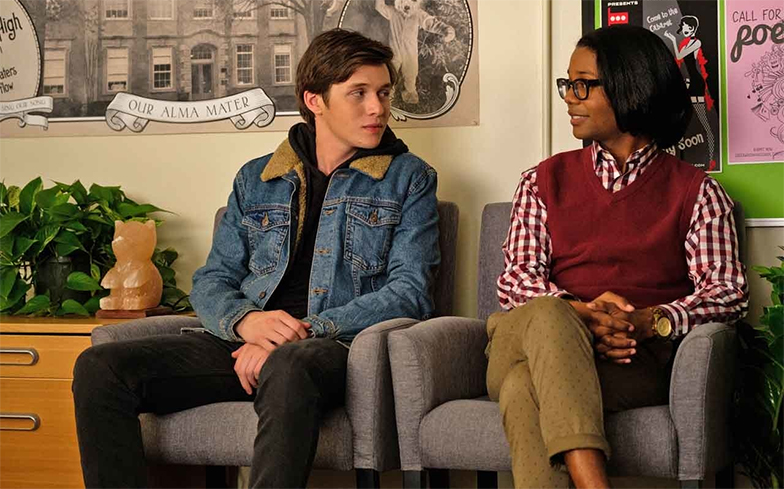
Ben Rothstein / 20th Century Fox
Which part of Simon’s story did you identify with the most?
I think the idea that on the outside it looked like I had an ideal life, but that didn’t make the shame and fear of my sexuality and coming out any less challenging. That’s one of the things I think why we were able to put this story in a mainstream Hollywood box. In that it seems it has all the hallmarks of a happy ‘Hollywood’ life, but it doesn’t mean the emotions and the currency of the pain and anger, and the fear really of when I tell the world who I really am, will they still love me? That’s equally powerful wherever you live, and whatever your upbringing is.
How did you work with Nick Robinson and Jennifer Garner to capture the emotion for their powerfully poignant scene talking about Simon’s coming out?
So that scene wasn’t in the original script. We all knew we wanted that scene, and we knew it would come before the dad scene, so we wanted to make each of them distinct. They each say something different, but they’re both what Simon needs to hear. The dad scene is, ‘I still love you’, and then the mum scene is, ‘You deserve love’. That’s really what drives him into the third act.
Jennifer Garner wanted a scene like that before she even signed on. One of the writers dreamed that up and it was so eloquent. She knew right away, and called me and said, ‘I want on. I can’t wait to say these words’. Honestly, as is very often the case when you’re directing, if you cast the right person you don’t really have to do much when you shoot the scene. We went to shoot it that first day, and during rehearsal on the wide shot, Nick burst into tears. Then I looked around and all the crew were crying. I realised, ‘Oh wow, everyone really needs to hear that.’ Not just someone who’s gay. Everyone needs to hear that they deserve love. And certainly they need to hear it by Jennifer Garner!
The film is coming out just three years after the book, so it seems like it was quite a seamless process. Did you face any challenges at all bringing it to the big screen?
It was really fast. I read the script and, what was so wonderful about 20th Century Fox is that they were like, ‘We’re making this movie’. They didn’t say, ‘Only if you get this star’, or ‘If you do this’. That allowed me to go get great talent, both in front and behind the camera, because everyone knew it was an actual job for an actual film that was happening. But it took a studio to say, ‘We’re doing this.’ That was a pretty remarkable thing, that they committed from the start to make this.
Considering the recent success of Call Me By Your Name, Moonlight, and now Love, Simon, do you think movie studios are becoming more confident in investing in LGBTQ stories for a mainstream audience?
I have limited film experience, but I can speak more as a film-goer. It would be nice to see as an audience member myself. There’s an openness now when it comes to telling stories about people from all walks of life. More and more representation is happening in mainstream cinema and I think audiences will be better for it, and the studios will be better for it.
Love, Simon is in cinemas in the US now, and will be released in the UK on 6 April.

